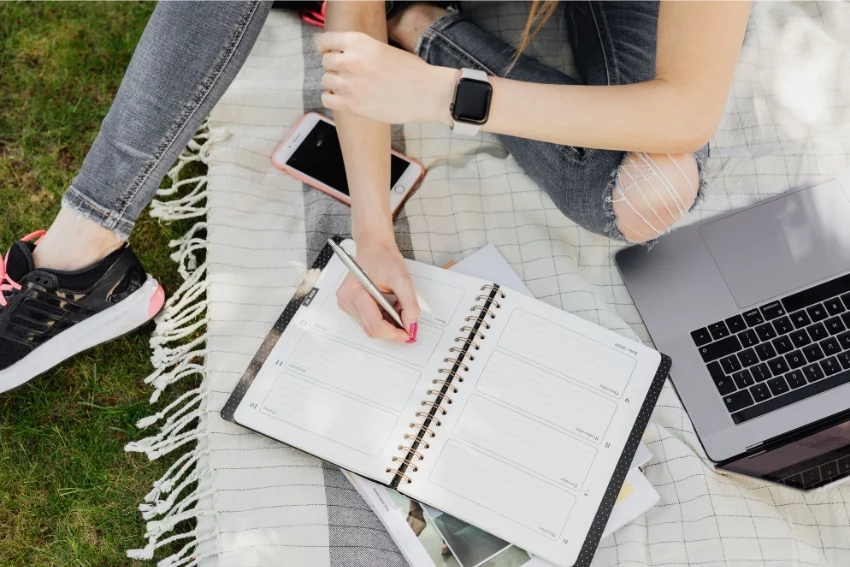Exams can be one of the most stressful times in a student’s life. The thought of having to sit for hours and recall all the information you’ve studied can make even the most prepared student feel anxious. As a GCSE student, you’re probably well aware of the pressure that comes with these exams, and you might be looking for ways to make exam day less daunting. Well, you’ve come to the right place! In this blog post, we’ll provide you with a comprehensive guide to help you prepare for and excel on exam day. From before the exam to after, we’ve got you covered. So, grab a cup of tea, take a deep breath, and let’s get started!
Before Exam Day
The days leading up to your GCSE exams can be filled with stress and anxiety, but taking care of your mental health is just as important as preparing academically. Here are some tips to help you prioritize your mental well-being leading up to the exam:
Practice self-care
Taking care of yourself should always come first. Make sure you’re getting enough sleep, eating well, and getting regular exercise. This will help keep you feeling physically and mentally strong.
Find balance
While it’s important to study and prepare for your exams, it’s equally important to find time for yourself. Take breaks, engage in activities you enjoy, and spend time with friends and family to avoid burnout.
Avoid last-minute cramming
Cramming the night before an exam is not only ineffective, but it can also cause unnecessary stress and anxiety. Instead, set aside dedicated study time well in advance of the exam, so you can focus on learning and retaining information.
Manage your time
Use a planner or schedule to manage your time leading up to the exam. Break your study sessions into manageable chunks to help prevent procrastination and maintain focus. Read on how to create a revision schedule.
Seek support
Don’t be afraid to reach out to friends, family, or teachers for support. Talking about your feelings with others can help you manage stress and anxiety and feel more confident and prepared for the exam.
By prioritising your mental health and following these tips, you can set yourself up for exam success while also feeling more calm and grounded leading up to the exam.
Exam Day Essentials

Exam day can be nerve-wracking, but being prepared can help alleviate some of that stress. In addition to having a good night’s sleep, eating a healthy breakfast, and arriving early, here are a few exam day essentials to make sure you have a successful experience:
Bring the right materials
Make sure you have all the materials you need, including pens, pencils, erasers, rulers, calculators, and any other materials that your exam board requires. Double-check your exam timetable to ensure that you’re bringing the right materials for each exam.
Wear comfortable clothes
Dress for comfort on exam day, but make sure your clothing is appropriate for the exam hall. Avoid clothes that are too tight or too loose, as they can be distracting or uncomfortable during the exam. You don’t want to be fidgeting with your clothes when you should be focusing on your exam!
Stay hydrated
Bring a water bottle with you to stay hydrated during the exam. Dehydration can lead to fatigue and difficulty concentrating, which is the last thing you need during an exam. Sipping water can also help calm your nerves and keep you feeling more relaxed.
Take deep breaths
When you’re feeling anxious or stressed, taking deep breaths can help calm your nerves and improve your focus. Before the exam begins, take a few deep breaths, and remind yourself that you’re well-prepared and capable of doing your best.
Use your time wisely
When the exam starts, read through all the questions carefully, and plan how you’ll use your time. Don’t rush through the exam, but be mindful of the clock and allocate your time based on the difficulty of the questions. Remember, it’s better to answer some questions well than to rush through all the questions and answer them poorly.
Read more on what to do the night before the GCSE exam.
Nutrition and Hydration
When it comes to performing at your best on exam day, nutrition and hydration play a crucial role. Here are some tips to help ensure that you’re fueling your body and mind for success:
Eat a healthy breakfast
Starting your day with a nutritious breakfast can help fuel your brain and provide you with the energy you need to stay focused during the exam. Consider eating foods like whole-grain toast, eggs, yogurt, and fruit for a balanced meal. Read more on why is breakfast so important.
Snack smartly
If you’re taking multiple exams in one day, it’s important to fuel your body with snacks that will provide sustained energy throughout the day. Consider snacks like nuts, seeds, fresh fruit, and whole-grain crackers. Avoid sugary snacks and energy drinks, as they can lead to energy crashes later on.
Stay hydrated
Staying hydrated is essential for maintaining focus and cognitive function. Make sure to drink plenty of water before and during the exam. Consider bringing a water bottle with you to the exam venue, so you can stay hydrated throughout the day.
Avoid caffeine and sugary drinks
While caffeine can help improve focus and alertness, too much can lead to anxiety and jitters, which can negatively impact your exam performance. Similarly, sugary drinks like energy drinks and soda can lead to energy crashes and difficulty concentrating. Stick to water, herbal tea, or unsweetened beverages instead.
By following these nutrition and hydration tips, you can help ensure that your body and mind are well-fueled and ready to tackle your GCSE exams with confidence.
Time Management
Effective time management is key to acing your GCSE exams. Here are some tips to help you manage your time efficiently during the exam:
Read the instructions carefully
Before you start the exam, take some time to read the instructions carefully. Make sure you understand the format of the exam, the number of questions, and the time limit. This will help you plan your time accordingly.
Allocate your time
Once you understand the exam format, allocate your time accordingly. Divide the time available by the number of questions to determine how much time you can spend on each question. Remember, some questions may take longer to answer than others, so be flexible with your time allocation.
Don’t spend too much time on one question
If you get stuck on a question, don’t spend too much time on it. Move on to the next question and come back to it later if you have time. Remember, every question carries equal weight, so it’s important to give each question a fair shot.
Use your time wisely
Make the most of every minute of the exam. Use any spare time to review your answers, check for mistakes, and add any final touches to your work.
Prioritise the questions
If you’re short on time, prioritize the questions that are worth the most marks or that you know you can answer well. Don’t waste time on questions that you’re unsure about or that you know will take too long to answer.
By following these time management tips, you’ll be able to make the most of your time and maximize your chances of success in your GCSE exams.
By incorporating these relaxation techniques into your exam day routine, you can help reduce stress and improve your overall exam performance.
Relaxation Techniques
Feeling anxious or stressed before an exam is normal, but it’s important to find ways to manage those feelings so that they don’t negatively impact your performance. Here are some relaxation techniques you can use to help calm your mind and body before and during the exam:
✅ Deep breathing
Taking deep breaths can help slow down your heart rate and calm your nerves. Take a deep breath in for a count of four, hold it for a count of seven, and exhale for a count of eight. Repeat this several times until you feel calmer.
✅ Progressive muscle relaxation
This technique involves tensing and then relaxing different muscle groups in your body, one at a time. Start by tensing your toes and then releasing the tension. Move on to your feet, legs, and so on until you reach your head.
✅ Visualisation
Visualizing yourself succeeding in the exam can help boost your confidence and reduce anxiety. Imagine yourself answering questions with ease and receiving a high score. Focus on the positive outcomes rather than the negative ones.
✅ Mindfulness
Mindfulness involves being present in the moment and paying attention to your thoughts and feelings without judgment. You can practice mindfulness by focusing on your breath, body sensations, or the environment around you. This can help reduce stress and improve focus.
✅ Exercise
Exercise is a great way to reduce stress and release tension. Consider going for a walk or jog before the exam or doing some light stretching to help calm your mind and body.
Post-Exam Self-Care
After you’ve completed your GCSE exams, it’s important to take care of yourself both physically and mentally. Here are some self-care tips to help you relax and recharge:
Treat yourself
You’ve worked hard and deserve a reward. Treat yourself to something you enjoy, whether it’s a favorite meal, a movie night with friends, or a day out exploring a new place.
Get enough rest
A good night’s sleep is essential for your physical and mental health. Make sure you’re getting enough rest to help your body recover from the stress of exams.
Stay active
Exercise is a great way to relieve stress and boost your mood. Consider trying a new activity or sport to keep yourself active and energized.
Connect with friends and family
Spending time with loved ones can help you feel supported and connected. Talk to friends and family about your exam experience, and enjoy their company.
Practice mindfulness
Practicing mindfulness can help you stay present in the moment and reduce stress. Consider taking a few minutes each day to practice deep breathing, meditation, or yoga.
By prioritising self-care after your GCSE exams, you can help reduce stress and improve your overall well-being.
Conclusion
In conclusion, GCSE exams can be a stressful time, but with proper preparation and self-care, you can make exam day less daunting. Taking care of your mental health and well-being before the exam is just as important as studying academically. Seek support from friends, family or teachers, manage your time effectively, and avoid last-minute cramming. On exam day, bring the right materials, dress comfortably, stay hydrated, and take deep breaths to calm your nerves. Finally, nutrition and hydration play a crucial role in helping you perform at your best, so make sure you eat a healthy breakfast, snack smartly, stay hydrated, and avoid caffeine and sugary drinks. If you need additional help, you can always turn to Edumentors, an online tutoring platform that provides last-minute revision tips from tutors from top UK universities. Remember, you’re well-prepared and capable of doing your best on exam day!








